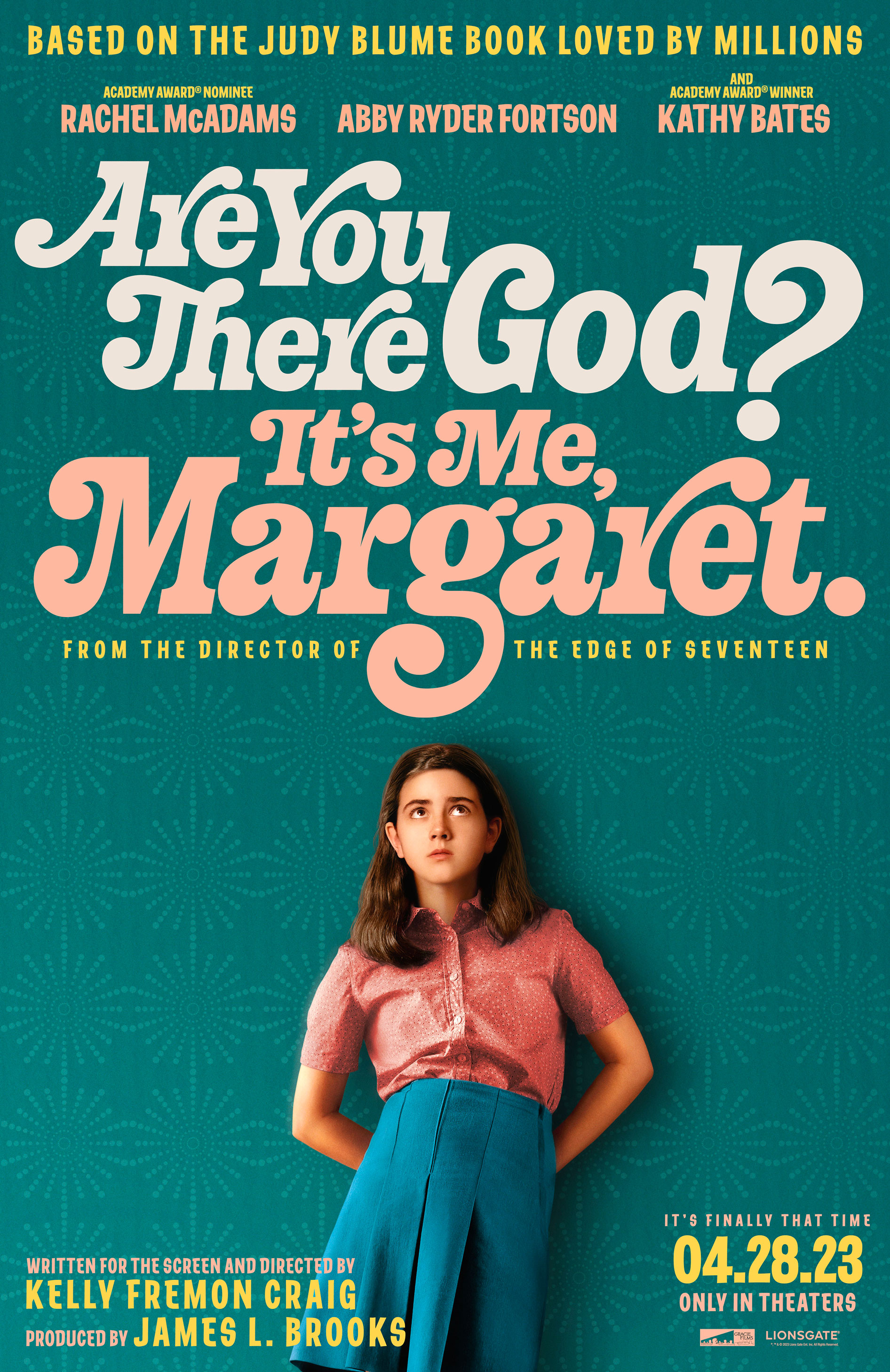Judy Blum's book "Are You There God? It's Me, Margaret." was read by generations of middle-school girls. The book was released in 1970, and by the time I hit middle-school age, it was already a best-selling "classic" tween book that everyone was talking about, mothers and daughters alike. I had a well-worn copy with the 1970s cover featuring the pretty blond, while my best friend had the original 1970s cover with Margaret on the bed against a yellow patterned background.

These old book covers clearly served as the inspiration for the theatrical release poster, where a bolder funky 70s serif font and a similar yellow patterned background introduce us to Margaret and other characters. I'd say that the art director did a great job here of making it stylishly like the original books, but updated for our modern memory and palette of what this all looked like.



The trailer for the movie shows that this font treatment and style is used throughout, and we get a glimpse of how much the original book has inspired the film. The awkward moment of buying "Teenage softies" from a boy and trying to cover it up with some tic-tacs, the girls club where a discarded Playboy prompts them to try and increase their busts. All the embarrassing moments of learning about menstruation, shaving, flat ironing your hair, and going through the messy and tumultuous throes of puberty with new friends in a new school in an unfamiliar place. Margaret relies on her mother, Barbara, who is also struggling to adapt to life outside the city, and her loving grandmother, Sylvia, who disapproves of their move and reminds them of it frequently. It's a timeless coming-of-age story with situations that all girls, mothers, and yes grandmothers too, recognize. Like the trailer says, it's a journey.
So as the beloved author Judy Blume began her press tour to promote the film adaptation of her book, she hit a slight snafu. An interview with the Sunday Times, headlined "Judy Blume: ‘I’m behind JK Rowling 100 per cent’" started the troubles.
Margaret even explicitly begs God to let her be “normal”, by which she means go through puberty. This moment is captured in the delightful upcoming film adaptation of Are You There God? It’s Me, Margaret, starring Rachel McAdams and Benny Safdie as Margaret’s parents, Kathy Bates as her grandma and Abby Ryder Fortson as Margaret. I tell Blume how strangely thrilling it is to see a movie about children where none of them are in possession of magical powers. “Yes, children are so used to superheroes now, aren’t they?” she says. Even in JK Rowling’s Harry Potter books the kids are magic, and I love those, I say.
“And I love her,” Blume immediately interjects. “I am behind her 100 per cent as I watch from afar.” Blume is referring to the abuse Rowling has received for speaking up in defence of women’s sex-based rights, and given that Blume has faced repeated attacks since the 1980s, for her books’ descriptions of adolescent sexuality and puberty, she knows what it’s like to be pilloried as an author.
Has she reached out to Rowling? “No, no. I met her very early on in her Harry Potter career, and she said to me, ‘Oh, my sister and I used to read all your books,’ and she talked about Deenie. I think once or twice we sent each other little notes. But I haven’t been in touch with her during this tough time. Probably I should.”
Soon Judy Blume, who has had a 54-year career as an author, and has won more than 90 literary awards and been translated into 32 languages, had to take back her words. On Twitter she posted a statement: “I stand with the trans community and vehemently disagree with anyone who does not fully support equality and acceptance for LGBTQIA+ people. Anything to the contrary is total bullshit.”
— Judy Blume (@judyblume) April 16, 2023
Now, to say that it was a misunderstanding should clear things up in most cases, but that never works when the trans community is involved it seems. So now Judy Blume has set out to promote her film with Dylan Mulvany, also known as the kiss of marketing death in ad agencies around the world after so many backlashes against brands partnering with Dylan.
I'm afraid that Lionsgate just made the same mistake that Ulta and Nike women did. With Ulta Dylan was discussing girlhood and future motherhood, with Nike for women, Dylan was hopping around like a bad caricature of how a woman exercises. Both of these promotions insulted the target market.
The target market for this film is women, who have grown from awkward young girls into mothers and eventually grandmothers. This is a film that the seventies generation of first readers would be bringing their daughters and grandchildren to. Having Dylan Mulvany represent here is as awkward as Dylan selling "Teenage softies", or Tampax for that matter. I predict that this will not go well for Lionsgate Movies.
